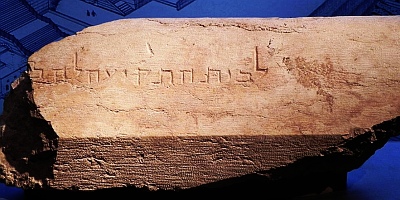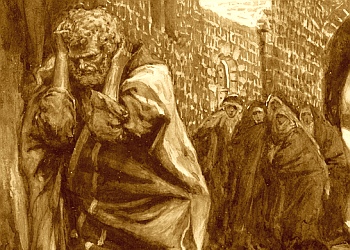DOWNLOAD "Roosters" MP3

|
|
Stone excavated from the southwestern corner of the Temple Mount in Jerusalem, bearing the inscription "To the place of trumpeting." |
|
by haRold Smith
a citizen of the Commonwealth (Ephesians 2:19) |
We think we know, we think we understand what the words presented to us on the pages of scripture mean. But, when we consider that every letter of every book in the Book were written by Hebrews from a Hebrew perspective formed out of a Hebrew mindset that was influenced by Hebrew culture and were addressed primarily to a Hebrew audience which understood the nuances of the Hebrew language, then we find these words take on a context different from those of our contemporary culture. Reading these words from the Hebraic perspective they were written from often gives us an entirely different meaning. For instance, in the passage from Luke 22 at the beginning of this article, it seems completely natural to us to believe that the "rooster" Yeshua was referring to was an actual bird crowing to announce the arrival of sunrise as we have all heard for ourselves in some point in our lives. However, we run into a problem with that assumption when opening up the Mishnah (the material embodying the oral tradition of rabbinic Judaism and forming the first part of the Talmud) and reading that fowl of any sort were not allowed in Jerusalem at this time over purity concerns (m. Bava Kamma 7.7 - click on highlighted words to view content)). Chickens, as you may know, are pretty dirty birds, leaving evidence of where they've been behind them everywhere. They also have a habit of getting into places you don't want them to be. To be sure that no chickens made their presence known in the Temple which would have desecrated the Holy Place or, worse yet, the Holy of Holies, the Mishnah says that the priestly officials simply forbid anyone in Jerusalem from having chickens. While it is doubtful the Romans would have been observant of this decree, it certainly would have had its desired effect upon those Hebrews surrounding the Temple and the priests therein. So, if roosters were not allowed to be raised in Jerusalem - just what, or who, was crowing and, just as importantly, what were they crowing about?
The English term "rooster" is translated from the Greek word, alektor, which is more accurately translated as the English, "cock". But this same Greek word, ἀλέκτωρ, can also mean "a man" as it is a singlular nominative masculine noun. So, "cockcrow" could just as easily be translated in this verse as, "the man will not cry out today before you deny three times that you know me" - indicating that the scriptures did not mistakenly place a rooster in Jerusalem when roosters were not allowed to be raised in the city. But, it still does not answer the question as to who this man was and what was he "crowing" about? For that answer, we have to dig a bit deeper into the Temple regulations surrounding the activities of the priests. The Mishnah references a specific time in the early morning: "He that was minded to clean the altar of ashes rose up early and immersed himself before the officer came. At what time did he come? Not always at the same time. Sometimes he came at cockcrow and sometimes a little sooner or later" (m. Tamid 1.2). "Cockcrow" refers to a time early in the morning when the priests began to prepare the Temple for the daily rigors: "Every day they used to remove the ashes from off the altar at cockcrow, or near to it, either before it or after it" (m. Yoma 1.8). And it does not mean a rooster crow, but rather the blast from a shofar (ram's horn trumpet) at the Temple that announced the time: "At cockcrow they blew a sustained, a quavering, and another sustained blast" (m. Sukkah 5.4). In other words, cockcrow refers to a time early in the morning when a shofar signaled the beginning of the day for work in the Temple.

|
| Peter's Denial |
As seen in the photo at the top of this article, excavations along the southwestern corner of the Temple Mount in Jerusalem uncovered a stone bearing a Hebrew inscription "to the place (lit. house) of trumpeting" suggesting that this stone marked an area on the southwestern corner of the Temple Mount, facing towards the city, where priests would blow the shofar announcing the different times of the day and week (see Josephus, War 4.12) marking the location from which cockcrow sounded.
|
"Shim'on, Shim'on, listen! The adversary has demanded to have you, to sift you like wheat!
But I prayed for you, that your trust might not fail. And once you have turned back in repentance, strengthen your brothers!" Luke 22:31-32 |
|
Would you like to connect and build relationships with other like-minded believers from around the world who are studying and applying the teachings from the articles posted on HeThatHasAnEar .com? CLICK HERE |
| CLICK HERE TO VIEW THE LAST ROUNDTABLE VIDEO |
Please feel free to email me at harold@hethathasanear.com.
While not claiming to have all the answers,
it would be an honor to partake with you of what Spirit is uncovering.